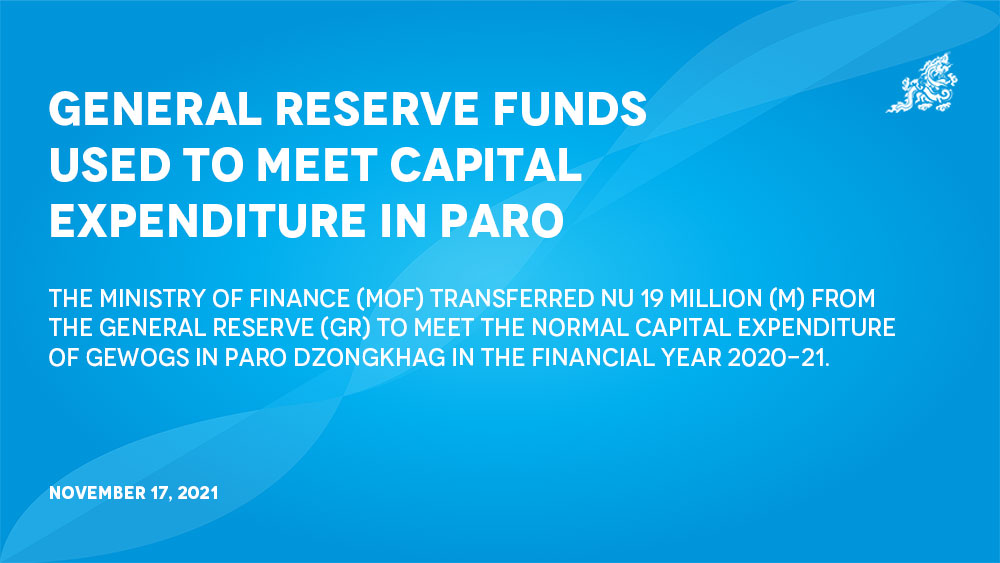Tashi Dema
The Ministry of Finance (MoF) transferred Nu 19 million (M) from the general reserve (GR) to meet the normal capital expenditure of gewogs in Paro dzongkhag in the financial year 2020-21.
The reserve, according to the national budget report, is an amount set aside to meet unforeseen, unavoidable, and unexpected future expenditure or financial obligations.
While the GR budget is provisioned for activities common across budgetary bodies, it is implemented only after fulfilling established criteria and formalities.
The GR budget is transferred to the budgetary agencies through technical adjustments.
According to the annual audit report launched last week and submitted to various authorities, the MoF had set aside Nu 3,335.997M as GR for the financial year.
It stated that while 46 percent of the GR fund transfers accounted for Covid-19 containment measures under disaster contingency, funds reserved for local government elections were transferred to meet normal capital expenditure in Paro without fulfilling the established criteria and formalities.
Of the Nu 19M transferred to Paro, Nu 2M was to maintain the Thongyue irrigation canal, Nu 1M to construct lams’ residences in Samtentsemo, Nu 4.5M to blacktop 4km farm road from Sali to Sili Goenpa, Nu 2.5M to construct a Chindukha farm road, Nu 1.5M to construct a Jelikha farm road, Nu 2.5M to improve a Tsebji farm road, and Nu 2M to construct a farm road in Tsedrona – Tseremna, Wanjugang – Singkha, Nabana-Sagona. While Nu 1M was to improve a farm road in Tsomji, Nu 2M was to improve a farm road from Phubana to Hoshatsen.
The Royal Audit Authority (RAA) pointed out that the activities were neither unforeseen nor unavoidable.
“Such activities should have been covered in the annual work plan of the gewog administrations through the normal budgetary process,” the report stated.
It was also pointed out besides diverting the funds provisioned for LG elections, the Nu 4.5M used to improve a farm road from Sali to Sili Goenpa deviated from the road design standard of the Road Classification Standard of Bhutan 2017.
According to RAA, such instances indicated a lack of clear policy guidelines to use the GR fund. “In absence of clear policy guideline regulating the use of the GR fund, the RAA could not ascertain the legitimacy and admissibility of fund transfers from the GR,” the report stated.
MoF responded to the audit report that the GR fund transfer was made based on checklist of criteria adopted within the delegation of financial authority and based on the existing government policies.
It stated that it follows some general basis to determine the budget provision, which includes ad-hoc special priority projects.
According to the ministry, recognising the importance to have proper guidelines to ensure uniformity and parity in the distribution of general provisions, the Department of National Budget is in the process of further strengthening the process. “A guideline has been drafted and finalized for implementation.”
However, RAA pointed out that the draft guideline does not clearly specify the delegation of financial powers for sanctioning funds from the GR. “The draft guideline also does not specify the process and admissibility of funding activities other than those provisioned for.”
RAA also recommended the ministry establish clear criteria on the admissibility funds from the GR, including the accountability process in the event of diversion of the fund to activities and programmes not included in the GR list.
Meanwhile, of the three reports RAA launched last week and submitted to authorities, the GR fund transfer was reflected in the auditor general’s (AG) report on annual financial statements that ended in June this year.


